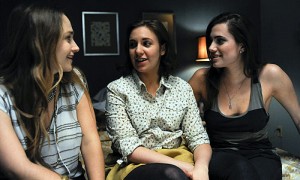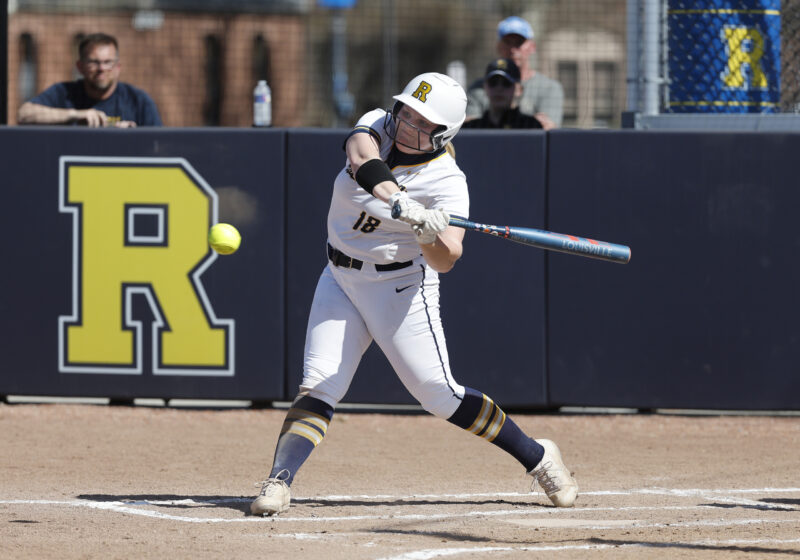Do you know any female in her early 20s that calls herself a woman? Chances are, probably not. Most of us are still just girls.
Lena Dunham captures that exact premise with her young comic voice as the writer, director and star of HBO’s new half hour comedy “Girls.” At 25, Dunham certainly seems to be living the dream, but this is not true of her character, Hannah Hovarth.
The pilot episode, which aired on Sunday, April 15, opens as Hannah’s parents decidedly cut her off from their bank account. As a struggling artist and unpaid intern, Hannah believes that her parents are committing an act of cruel and unusual punishment.
“I can last in New York for three and a half more days, maybe seven if I don’t eat lunch,” she says. This is not a woman speaking. It is a girl.
What is immediately recognizable throughout the pilot is that Hannah is not the most likable of characters. Nor is her best friend Marnie (Allison Williams) or her other friends, Jessa (Jemima Kirke) and Shoshanna (Zosia Mamet). They are each distinctly flawed characters who, when given a decision to make, have a tendency to chose the wrong one.
Hannah is self-destructive, a writer incapable of finding her way around her own life. Marnie is self-involved and uninterested in a boyfriend that throws every ounce of his attention her way. Jessa doesn’t care if she’s hours late for a dinner thrown in her honor and Shoshanna still wears Juicy tracksuits and claims to be Carrie with a bit of Samantha once in a while.
The inevitable comparisons to “Sex and the City” have been made, but are seemingly ill-informed. Yes, “Girls” is about four friends trying to make it in New York City. But these are girls in their early ’20s, fresh out of college. Dunham has created a brutally realistic comedy about the modern generation of girls entering the so-called real world. The apartment is cramped. The jobs are far from glamorous. There is a distinct lack of high-heels. And the sex is not good. It is really not good.
Hannah’s friend with benefits is not really much of a friend and the sex doesn’t appear to be a benefit. Adam Sackler (Adam Driver) attacks Hannah for her appearance while squeezing the fat on her back and taunts her personality all in the course of an afternoon post-sex. And she still doesn’t understand why he won’t text her.
This is what we get in a generation that lacks in-person conversation. As Marnie puts it, our generation plays by the rules of the “totem of chat.”
“The lowest, that would be Facebook. Followed by Gchat. Then texting, then email, then phone. Face-to-face is of course ideal, but it’s not of this time,” she says.
“Girls” manages to capture an honest and candid openness about the 20-something girl. Dunham has brought her vision to the television set and she isn’t about to hold your hand while walking through the abyss of post-college life. This is what has everyone talking about the new HBO comedy.
“I don’t want to freak you out, but I think I may be the voice of my generation,” Hannah says to her parents while trying to convince them to reconsider the cut off. “Or, at least, a voice of a generation.”
They don’t take her quite seriously and neither does the audience. Nor should they. Hannah says this while she is completely high on opium tea and trying her very hardest not to pass out. She may be an artist, but she’s an artist that doesn’t quite know what to do with herself yet and the audience can feel that in all its ugliness.
To some, this may be the most relatable show they’ve ever watched. To others, they might have no idea how these girls could treat their bodies and emotions in such a way. Either way, Dunham has created a conversation. For years, flawed male characters have been heralded as icons of television. I’m talking about Don Draper, the men of “Entourage,” even Big from “Sex and the City.” But a female character steps out of line and she’s a bitch. This is not true of all shows or all characters — however, it is a stereotype that has persisted.
The recent landscape of television is changing that. You don’t have to look far for all the “girl”-dominated works. “New Girl” and “Two Broke Girls” along with the movie “Bridesmaids” have begun to shape a new horizon for females in television. Dunham has developed a show that looks at characters whom you don’t immediately love, but ones that you may recognize bits and pieces of in your friends and in yourself.
They are characters that are lost. And aren’t we all on the verge of being lost when we teeter off that cliff after graduation? But when we do step off the edge, we have friends alongside us. Hannah and Marnie are those friends, clinging to each other for dear life while they try to make their own way.
The profoundly talented cast alongside Executive Producer Judd Apatow has propelled “Girls” into a spotlight, with only one episode aired to the audience thus far. But, with an outlook as strong as Dunham’s, I think we can expect more unfiltered wit, intelligence and humor to come. Dunham’s voice may not be the voice of all girls, but it’s the voice of some girls, and it’s definitely all her own.
Rosenberg is a member of the class of 2012.






